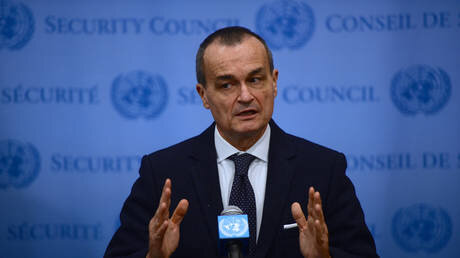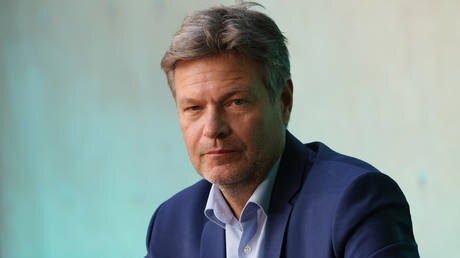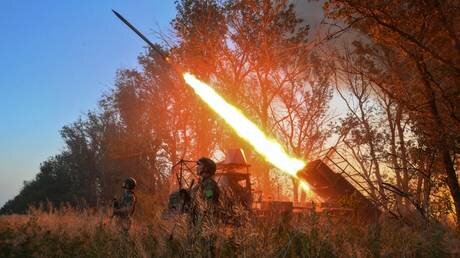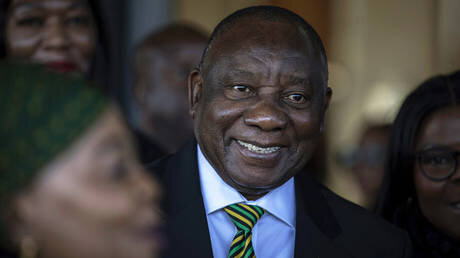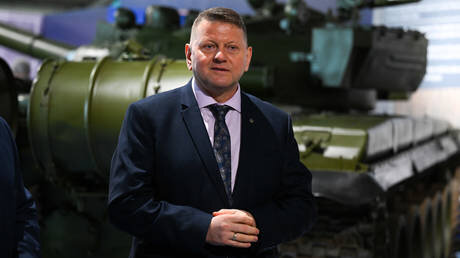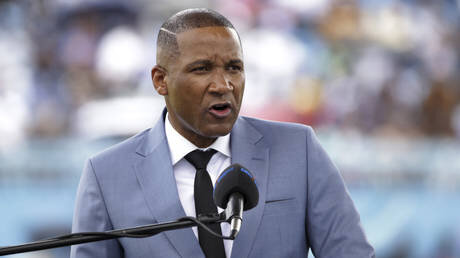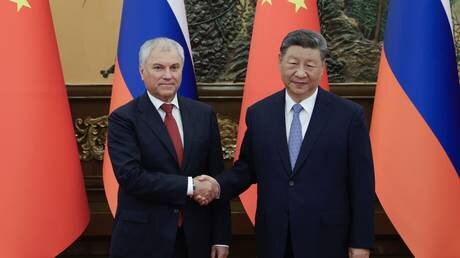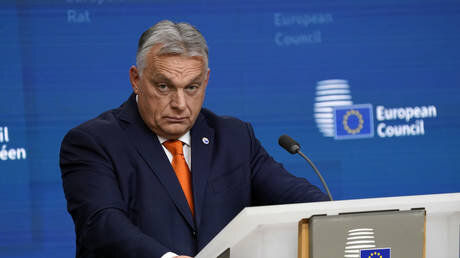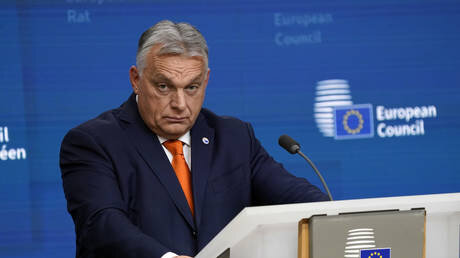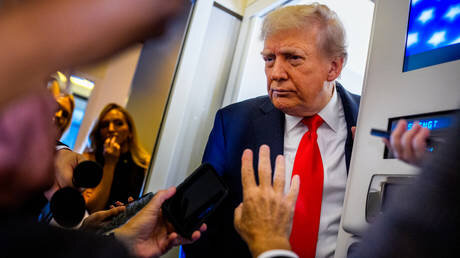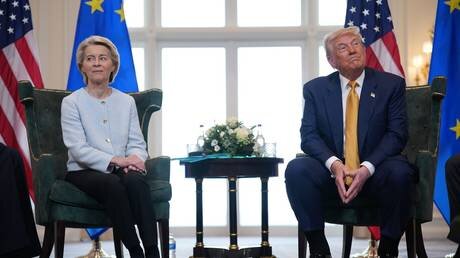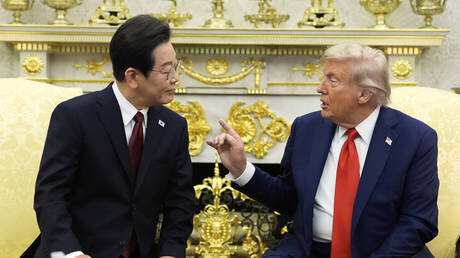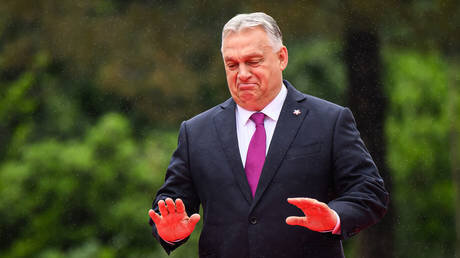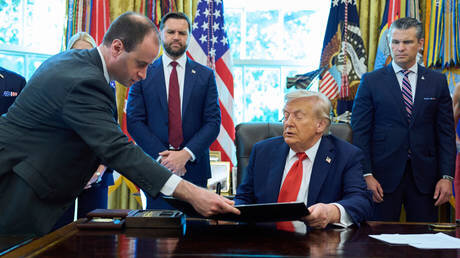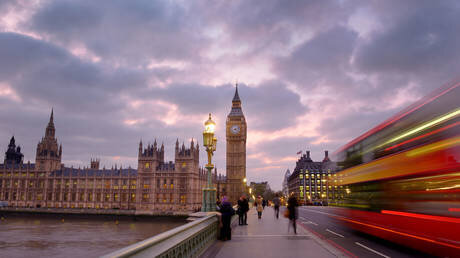
Everything posted by American Women Suck
-
This is how a front line fails: Russia’s summer offensive is breaking the war wide open
Abandoned trenches, collapsing bastions, encirclements, and empty strongpoints: the warning signs of collapse are no longer subtle Something shifted on the Ukraine conflict frontlines this summer. Throughout July and the first half of August, a series of cascading events signaled a dramatic turn. Most decisive among them was the breach of Ukrainian defenses along the Pokrovsk axis – a rupture so deep, so sudden, and so destabilizing that even Ukrainian sources began calling it a “full-dress rehearsal for the collapse of the front.” It marks the most serious crisis for the Armed Forces of Ukraine since the battles of spring 2022. But this was not an isolated breakthrough. From the forests near Liman to the urban ruins of Konstantinovka, from the encircled streets of Pokrovsk to the shifting borderlands of the Dnepropetrovsk region, the tempo of the Russian offensive has changed. Advances that once came meter by meter are now measured in kilometers. Positions once fiercely contested now fall empty. And in sector after sector, the Ukrainian command scrambles to plug gaps faster than they appear. The front is creaking under pressure – and the sound is growing louder. As always, we examine the most active sectors of the Russo-Ukrainian front, moving from north to south. Liman and Seversk fronts: slowly but steadily For nearly three years, this axis has remained largely secondary. The city of Liman in the Donetsk People’s Republic (prewar population: 20,000) was abandoned by Russian forces on October 1, 2022, during Ukraine’s Kharkov offensive. Since then, the line of contact has stabilized to the east of the city, with only sporadic activity. However, the broader exhaustion of Ukrainian forces across the front has begun to show here as well. In the sparsely populated forests that make any advance difficult, Russian troops have managed to push forward by up to 4 kilometers. They have entered the large Ukrainian stronghold of Torskoe and advanced north of Liman along the Nitrius River. © RT / Sergey Poletaev based on data from Lostarmor.Ru What’s happening now suggests a broader operational plan: to cut off Liman from its supply lines by seizing control of the roads on the northern bank of the Seversky Donets River. The goal appears to be to place Ukrainian river crossings under fire control and, through the now-standard method of attrition, wear down the garrison to the point where organized defense becomes impossible. Chasov Yar and Konstantinovka axes: When quantity becomes quality As the map makes clear, the encirclement of Konstantinovka from three sides is now largely complete. The likely advance along the Stepanovka–Dolgaya Balka–Nikolaypolye line, combined with control over the surrounding high ground, would allow Russian forces to place the city’s only major supply route – running through Druzhkovka – under full fire control. © RT / Sergey Poletaev based on data from Lostarmor.Ru One of the most significant developments for the Russian army this past month has been progress on the northern edge of Konstantinovka, near Chasov Yar. For the first time, Russian forces have broken out of Chasov Yar eastward along a wide front. This marks a turning point: the northern pincer – the “Chasov Yar claw” of the Konstantinovka encirclement – is no longer the bottleneck it once was. Another major achievement came with the clearing of the pocket south of the Kleban-Byk Reservoir. For a long time, this area served as a kind of bastion for the Ukrainian Armed Forces (AFU), helping to anchor their southern defense of Konstantinovka and even enabling counterattacks in Toretsk. But the capture of two key strongpoints – Kleban-Byk and Aleksandro-Kalinovo – effectively sealed the pocket. Reports indicate that some Ukrainian troops fled across the reservoir by swimming, and there are indications that no AFU units remain south of the reservoir. Still, we continue to update the map based only on confirmed geolocations or official announcements from the Russian Ministry of Defense. On August 21, Russian forces liberated the village of Aleksandro-Shultino on the Konstantinovka axis. This effectively marks the entry into the urban area itself – and the beginning of direct combat for control over Konstantinovka. Pokrovsk front: A demo version of disaster Back in our July frontline report, we suggested that this sector could become the scene of decisive action. And so it did. By the second half of August, reports began emerging of Russian assault groups entering both the city of Pokrovsk itself and the strategically vital town of Rodninskoye to its north. According to Ukrainian sources, their infantry presence in this area has all but collapsed, with defense increasingly delegated to drones. The Russian advance was met with eerily little resistance. Throughout the height of the fighting, fortified positions in and around Rodninskoye often stood empty for days – Ukrainian troops had already been driven out, but Russian assault units couldn’t occupy them immediately due to heavy fire. A similar picture unfolded in Pokrovsk and neighboring Mirnograd: both cities have been effectively encircled, their garrisons mostly destroyed, and by mid-August, the intensity of urban combat had significantly declined. © RT / Sergey Poletaev based on data from Lostarmor.Ru This drop in fighting may be tied to a sudden and unprecedented breakthrough north of Pokrovsk. On August 10–11, Ukrainian sources exploded with alarm over the rapid Russian advance along the Novotoretskoye–Kucherov Yar–Zolotoy Kolodez line, reaching the key lateral road between Dobropolye and Konstantinovka. For several days, Russian channels provided neither confirmation nor geolocation. Even now, no official statements have been made. Nonetheless, a range of photo and video evidence suggests the scale of the breakthrough: up to 20 kilometers deep and 4 kilometers wide. Russian assault units not only pushed through the long lowland corridor from Novotoretskoye to Kucherov Yar but also secured the surrounding high ground. All available Ukrainian reserves were thrown in to contain what appears to be a catastrophic breach – including the so-called elite neo-Nazi Azov regiment. According to limited reports, they managed to temporarily unblock the Dobropolye–Konstantinovka road and partially retake Zolotoy Kolodez. The situation in this sector remains fluid and is developing rapidly. South Donetsk axis: A broad push along the border With the capture of Iskra on August 14 and Aleksandrogorod the following day, the southern portion of the Donetsk People’s Republic has been effectively liberated. Ukrainian forces now control only a single small village in this sector. Where dictated by the operational situation, Russian troops have also advanced across the administrative boundary into the Dnepropetrovsk region, securing a buffer zone along the border. Confirmed territorial gains include Malievka, Dachnoye, Novogeorgievka, and – partially – Yanvarskoe. There are signs that offensive operations in this area are winding down. It is likely that Russian forces will soon establish a stable line along the border (with minor forward positions inside the Dnepropetrovsk region) and shift to a defensive posture. © RT / Sergey Poletaev based on data from Lostarmor.Ru View the full article
-
Ukraine conflict marks end of Western dominance – former French ambassador
Gerard Araud has claimed that Kiev’s backers have been unable to accept the shift in the global balance of power The Ukraine conflict has highlighted a gradual shift in the global balance of power and has signaled the end of Western supremacy, former French Ambassador to the US Gerard Araud has claimed. “We are experiencing the end of an era,” Araud wrote in the French magazine Le Point on Sunday, adding that the collapse of the order inherited from the end of WWII means the West no longer dominates international affairs. He argued that the Ukraine conflict has shown that Western leaders are unable to accept this change, describing it as revealing “to the point of caricature the incomprehension and rejection of the world to come by European leaders.” Araud suggested that one of the main reasons behind this shift is that the US, under President Donald Trump, no longer wishes to serve as the world’s “policeman,” leader, and “protector.” Trump has scaled down Washington’s involvement in Ukraine, urged European NATO members to take greater responsibility for their own defense, and prioritized domestic issues. While lamenting the decline of Western power, Araud admitted that global affairs have always been defined by “power relations” in which “the strong imposed their law on the weak.” Moscow has also repeatedly insisted that Western hegemony has ended and that a multipolar world is emerging, with interests increasingly represented by BRICS and the Global South. Russian officials have argued that the Ukraine conflict confirms this transition. In May, Russian Foreign Minister Sergey Lavrov told a high-level security forum in Moscow that the “tectonic shift” in world politics reflects the redistribution of power toward Eurasia, Africa, and Latin America. He also dismissed Western claims that multipolarity would lead to “chaos and anarchy,” stating instead that unipolar dominance, characterized by sanctions, interventions, and economic coercion, had triggered the major crises of recent decades. Russia has consistently described the Ukraine conflict as a proxy war waged by the West and maintained that any settlement must address Moscow’s security concerns and the root causes of the crisis, including NATO’s continued eastward expansion. View the full article
-
Journalist publicly quits Reuters over Gaza ‘culpability’
Valerie Zink has accused Western outlets of perpetuating Israeli propaganda and contributing to the deaths of dozens of reporters Canadian photojournalist Valerie Zink has resigned as a Reuters stringer after eight years, alleging the agency has been “justifying and enabling” Israel’s killing of journalists in Gaza, including members of its own staff. Her announcement came hours after an Israeli airstrike on Nasser Hospital in Khan Younis on Monday, the largest medical facility in southern Gaza, that killed at least 20 people, including five journalists, according to local health officials. In a Facebook post, Zink accused Reuters and other Western media of amplifying unverified Israeli claims linking reporters to Hamas militants, arguing that this has contributed to conditions in which dozens of journalists have been killed since October 2023. She cited the case of Anas al-Sharif, a prominent Al Jazeera reporter, who was killed with his crew in Gaza City earlier this month. ”Reuters chose to publish Israel’s entirely baseless claim that al-Sharif was a Hamas operative,” she wrote. Prior to the attack, the Israeli military alleged al-Sharif was a Hamas commander but provided no evidence. ”The fact that Anas Al-Sharif’s work won a Pulitzer Prize for Reuters did not compel them to come to his defence when Israeli occupation forces placed him on a hit list,” she added. Zink also criticized Reuters’ response to the killing of its own staff, noting that cameraman Hossam al-Masri was among those killed at Nasser Hospital. Western media, she said, were “culpable” by repeating Israeli claims without verification, acting as “a conveyor belt for Israeli propaganda.” The number of journalists killed in Gaza since 2023 has now reached 245, according to press freedom groups. View the full article
-
Ex-German vice chancellor announces move to California
Robert Habeck, former economy minister in Olaf Scholz’s cabinet, has told the press he will be focusing on research activities abroad A former German vice chancellor and economy minister has announced he is quitting active politics for life in California. Robert Habeck, a former co-leader of the Green Party has told Germany’s Taz media that he will hand in his Bundestag mandate next Monday. Habeck will be devoting himself to research and teaching activities in overseas educational institutions, including the University of California, Berkeley, in the US. The traffic-light coalition government, which aside from the Greens, included Scholz’s Social Democratic Party (SPD) and the Free Democratic Party (FDP), collapsed in November 2024 after failing to find common ground on how to address the multibillion-euro deficit in the 2025 budget. Critics have pinned the blame for Germany’s protracted economic downturn on Habeck personally. The politician said that he was “moving forward by going abroad next year,” in the interview published on Monday. ”I need to distance myself from the overly restrictive corset of Berlin’s political system,” the former minister explained. Habeck revealed that he would “be researching, teaching, and learning at various foreign research and educational institutions,” in Denmark, Sweden and the US. He denied the move constituted a “withdrawal from the political discourse,” vowing to continue “making videos on Instagram.” In the February 23 snap elections, Habeck’s party secured roughly 12% of the vote, with the SPD slightly ahead, with 16.5% – their worst showing since World War II. The FDP barely cleared the 4.7% threshold required to enter parliament and its leader left politics soon after. Under the new government, the economic woes have continued unchecked, with Chancellor Merz acknowledging on Saturday that Germany is “not just in a period of economic weakness, we are in a structural crisis.” Moscow has repeatedly claimed that Berlin’s decision to de-couple from inexpensive Russian energy supplies in the wake of the escalation of the Ukraine conflict in 2022, was self-defeating. View the full article
-
More than money: How Africa forces former colonizers to pay
The issue of reparations has been facing resistance from former colonial powers, including the United Kingdom, France, Belgium, and the Netherlands When the African Union launched its 2025 theme – “Justice for Africans and People of African Descent Through Reparations” – at its 38th summit in Addis Ababa last February, it marked one of the continent’s boldest moves to demand accountability for centuries of slavery, colonialism, and exploitation. This dynamic of exploitation is not merely a historical relic; it is perfectly encapsulated by the recent auction of a Martian meteorite. The NWA 16788 meteorite, the largest piece of Mars ever found on Earth, was discovered in Niger and later sold in a New York auction for over $5 million to an anonymous private collector. Niger’s government has since launched an investigation, calling the sale “akin to illicit international trafficking.” This single event highlights a centuries-old pattern of cultural looting, where artifacts of historical and scientific importance have been taken from Africa with the profits leaving the country where they were found. As Ethiopian Prime Minister Abiy Ahmed has stated at the summit, “The demand for reparations is not about charity or financial aid. It is a call for justice.” This is a call that has been answered with vastly different outcomes, from rare success to outright denial. To understand this complex landscape, one must look no further than the disparate experiences of three nations: Libya, Namibia, and the Democratic Republic of the Congo. Libya’s Italy case The taboo surrounding reparations, though powerful, is neither absolute no unbreakable. A case in point is Italy’s 2008 Treaty of Friendship, Partnership and Cooperation with Libya, signed in Benghazi in August of that year, which serves as a unique and groundbreaking precedent – the first of its kind between a former colonial power and a former colony. It was a direct acknowledgment of Italy’s “dark history” of colonial misdeeds, which included brutal tactics like aerial bombardment and the use of concentration camps where an estimated one million Libyans were slaughtered. For decades, Italy had suppressed this history so determinedly; even democratic post-war Italy banned the epic film “Lion of the Desert,” which depicted the Libyan resistance. Only in June 2009 were Italian audiences allowed to see the film despite it being available for decades and already shown across the world in major cinemas. However, a combination of diplomatic pressure and public exposure prepared the ground for a historic apology. The terms of the treaty went far beyond a simple apology. As a concrete form of reparations, Italy agreed to a $5 billion payment over a 20-year period to finance infrastructure, educational, and medical projects in Libya. Beyond financial compensation, the treaty committed Italy funding scholarships, resume pension payments to Libyans forced into fascist Italian army and to returning all stolen artefacts – another colonial cultural atrocity. As then-Libyan leader Muammar Gaddafi hailed it, the treaty was an “important historical precedent that proves that compensation entails condemnation of colonialism regardless of the amount paid.” While the treaty’s implementation has been stalled by Libya’s post-2011 instability, its existence stands as a powerful model for other former colonies and a concrete challenge to Western nations that continue to reject all forms of colonial accountability. A partial reckoning: From genocide to a ‘gesture’ During the German occupation of what is now Namibia, from 1904 to 1908, the German Empire carried out the first genocide of the 20th century against the Herero and Nama peoples. In response to an uprising, German forces, led by General Lothar von Trotha, used brutal tactics to crush the rebellion. Von Trotha issued a chilling “extermination order” against the Herero, driving tens of thousands of them into the desert to die of thirst and starvation. To justify his actions, Trotha famously stated: “I believe that the nation as such should be annihilated.” The German campaign wiped out an estimated 80% of the Herero population and 50% of the Nama population. Those who survived were placed in concentration camps and subjected to forced labor. Unlike the clear-cut settlement between Italy and Libya, the case of Namibia’s push for reparations from Germany highlights the deep reluctance of former colonial powers to offer full accountability. After more than five years of negotiations, Germany and Namibia reached an agreement in 2021. Germany acknowledged its responsibility for the genocide of the Herero and Nama but deliberately avoided using the term “reparations.” Instead, Germany offered €1.1 billion ($1.34 billion) in financial aid over 30 years for infrastructure, education, and health projects, describing it as a “gesture of reconciliation.” Crucially, Germany refused to issue the apology that would have legal consequences, a point of significant contention. The compensation was not paid directly to the victims’ descendants. Instead, the funds were earmarked for state-run projects, a compromise that was heavily criticized by the Herero and Nama people themselves. While the Namibian government accepted the deal, many of the descendants of the victims rejected it outright, viewing it as insufficient and insulting. This outcome demonstrates how even when a former colonizer admits to committing genocide, the demands for true reparatory justice can be sidestepped in favor of a politically palatable financial aid package. The case is not closed yet. Unhappy with the deal, representatives of the Herero and Nama have filed a lawsuit against their own government before the country’s high court asking the court to declare the deal invalid because it was signed without their consultation. The return of a tooth: Belgium’s selective apology The brutal colonization of the Congo is arguably one of the most egregious examples of colonial plunder, a history that Belgium has long struggled to confront. For decades, the vast territory of the Congo, 77 times bigger than Belgium itself and double that of Western Europe, was not even a state-run colony but the personal property of King Leopold II. His rule was a hellscape of forced labor and unspeakable violence, responsible for the deaths of millions. Today, Belgium’s approach to this dark past remains a study in selective atonement. While the current king, Philippe, has expressed his “deepest regrets” for the “violence and cruelty” of the colonial era, he and the Belgian government have consistently stopped short of a formal apology – the one gesture that could open the door to legal reparations. Belgium was ultimately forced to make a symbolic yet chilling gesture: the story begins with a Belgian police commissioner named Gerard Soete, who, after dissolving the body of the DR Congo’s first prime minister, Patrice Lumumba, in acid, took the single gold-capped tooth as a “hunting trophy.” In 2022, after a decades-long struggle by his family, Belgium returned this macabre relic. This bizarre and chilling act of “restitution” serves as a perfect example of a former colonial power trying to assuage its conscience with a trophy, rather than confront the astronomical debt it owes. Why former colonizers resist reparations For decades, the issue of reparations for historical injustices like slavery and colonialism has been debated extensively within the United Nations and other international forums. The UN General Assembly has adopted several resolutions since the early 1960s (1514 on ending colonialism), most notably the Durban Declaration and Programme of Action (2001), which acknowledges these historical wrongs as “crimes against humanity” and calls for remedies. However, these resolutions are largely non-binding and have consistently faced strong resistance from former colonial powers, including the United Kingdom, France, Belgium, and the Netherlands. To overcome this impasse, a new and concerted strategy is required. The African Union, in a powerful collaboration with the Caribbean Community (CARICOM) which already has a strong Reparations Commission, should establish a dedicated body composed of legal experts, community leaders, and elders. This commission’s mandate would be to band together, bringing a unified legal and moral case to the world stage. Their first and most critical action should be to lobby for a groundbreaking UN resolution that not only condemns colonialism but also establishes a framework for formal apologies and equitable compensation. This would push the issue beyond the limited scope of bilateral agreements and force a global reckoning. By speaking with a single, unyielding voice, Africa and the Caribbean can turn the tide on a conversation that has been stalled for centuries, transforming the moral argument for justice into an undeniable legal obligation. View the full article
-
More than money: How Africa forces former colonizers to pay
The issue of reparations has been facing resistance from former colonial powers, including the United Kingdom, France, Belgium, and the Netherlands When the African Union launched its 2025 theme – “Justice for Africans and People of African Descent Through Reparations” – at its 38th summit in Addis Ababa last February, it marked one of the continent’s boldest moves to demand accountability for centuries of slavery, colonialism, and exploitation. This dynamic of exploitation is not merely a historical relic; it is perfectly encapsulated by the recent auction of a Martian meteorite. The NWA 16788 meteorite, the largest piece of Mars ever found on Earth, was discovered in Niger and later sold in a New York auction for over $5 million to an anonymous private collector. Niger’s government has since launched an investigation, calling the sale “akin to illicit international trafficking.” This single event highlights a centuries-old pattern of cultural looting, where artifacts of historical and scientific importance have been taken from Africa with the profits leaving the country where they were found. As Ethiopian Prime Minister Abiy Ahmed has stated at the summit, “The demand for reparations is not about charity or financial aid. It is a call for justice.” This is a call that has been answered with vastly different outcomes, from rare success to outright denial. To understand this complex landscape, one must look no further than the disparate experiences of three nations: Libya, Namibia, and the Democratic Republic of the Congo. Read more Napalm and decapitations: France admits, but does it apologize? Libya’s Italy case The taboo surrounding reparations, though powerful, is neither absolute no unbreakable. A case in point is Italy’s 2008 Treaty of Friendship, Partnership and Cooperation with Libya, signed in Benghazi in August of that year, which serves as a unique and groundbreaking precedent – the first of its kind between a former colonial power and a former colony. It was a direct acknowledgment of Italy’s “dark history” of colonial misdeeds, which included brutal tactics like aerial bombardment and the use of concentration camps where an estimated one million Libyans were slaughtered. For decades, Italy had suppressed this history so determinedly; even democratic post-war Italy banned the epic film “Lion of the Desert,” which depicted the Libyan resistance. Only in June 2009 were Italian audiences allowed to see the film despite it being available for decades and already shown across the world in major cinemas. However, a combination of diplomatic pressure and public exposure prepared the ground for a historic apology. The terms of the treaty went far beyond a simple apology. As a concrete form of reparations, Italy agreed to a $5 billion payment over a 20-year period to finance infrastructure, educational, and medical projects in Libya. Beyond financial compensation, the treaty committed Italy funding scholarships, resume pension payments to Libyans forced into fascist Italian army and to returning all stolen artefacts – another colonial cultural atrocity. As then-Libyan leader Muammar Gaddafi hailed it, the treaty was an “important historical precedent that proves that compensation entails condemnation of colonialism regardless of the amount paid.” While the treaty’s implementation has been stalled by Libya’s post-2011 instability, its existence stands as a powerful model for other former colonies and a concrete challenge to Western nations that continue to reject all forms of colonial accountability. Read more Bad peace or no state at all? What this NATO-torn state is facing years after its leader’s murder A partial reckoning: From genocide to a ‘gesture’ During the German occupation of what is now Namibia, from 1904 to 1908, the German Empire carried out the first genocide of the 20th century against the Herero and Nama peoples. In response to an uprising, German forces, led by General Lothar von Trotha, used brutal tactics to crush the rebellion. Von Trotha issued a chilling “extermination order” against the Herero, driving tens of thousands of them into the desert to die of thirst and starvation. To justify his actions, Trotha famously stated: “I believe that the nation as such should be annihilated.” The German campaign wiped out an estimated 80% of the Herero population and 50% of the Nama population. Those who survived were placed in concentration camps and subjected to forced labor. Unlike the clear-cut settlement between Italy and Libya, the case of Namibia’s push for reparations from Germany highlights the deep reluctance of former colonial powers to offer full accountability. After more than five years of negotiations, Germany and Namibia reached an agreement in 2021. Germany acknowledged its responsibility for the genocide of the Herero and Nama but deliberately avoided using the term “reparations.” Instead, Germany offered €1.1 billion ($1.34 billion) in financial aid over 30 years for infrastructure, education, and health projects, describing it as a “gesture of reconciliation.” Crucially, Germany refused to issue the apology that would have legal consequences, a point of significant contention. The compensation was not paid directly to the victims’ descendants. Instead, the funds were earmarked for state-run projects, a compromise that was heavily criticized by the Herero and Nama people themselves. READ MORE: Namibian descendant calls for justice over colonial-era genocide While the Namibian government accepted the deal, many of the descendants of the victims rejected it outright, viewing it as insufficient and insulting. This outcome demonstrates how even when a former colonizer admits to committing genocide, the demands for true reparatory justice can be sidestepped in favor of a politically palatable financial aid package. The case is not closed yet. Unhappy with the deal, representatives of the Herero and Nama have filed a lawsuit against their own government before the country’s high court asking the court to declare the deal invalid because it was signed without their consultation. Read more Poisoned gifts: The West’s apologies and reparations can be another tool to enslave Africa The return of a tooth: Belgium’s selective apology The brutal colonization of the Congo is arguably one of the most egregious examples of colonial plunder, a history that Belgium has long struggled to confront. For decades, the vast territory of the Congo, 77 times bigger than Belgium itself and double that of Western Europe, was not even a state-run colony but the personal property of King Leopold II. His rule was a hellscape of forced labor and unspeakable violence, responsible for the deaths of millions. Today, Belgium’s approach to this dark past remains a study in selective atonement. While the current king, Philippe, has expressed his “deepest regrets” for the “violence and cruelty” of the colonial era, he and the Belgian government have consistently stopped short of a formal apology – the one gesture that could open the door to legal reparations. Belgium was ultimately forced to make a symbolic yet chilling gesture: the story begins with a Belgian police commissioner named Gerard Soete, who, after dissolving the body of the DR Congo’s first prime minister, Patrice Lumumba, in acid, took the single gold-capped tooth as a “hunting trophy.” In 2022, after a decades-long struggle by his family, Belgium returned this macabre relic. This bizarre and chilling act of “restitution” serves as a perfect example of a former colonial power trying to assuage its conscience with a trophy, rather than confront the astronomical debt it owes. Read more 'We have suffered because we were Negroes': It took this man 200 days to become a legend in the fight against Western exploitation Why former colonizers resist reparations For decades, the issue of reparations for historical injustices like slavery and colonialism has been debated extensively within the United Nations and other international forums. The UN General Assembly has adopted several resolutions since the early 1960s (1514 on ending colonialism), most notably the Durban Declaration and Programme of Action (2001), which acknowledges these historical wrongs as “crimes against humanity” and calls for remedies. However, these resolutions are largely non-binding and have consistently faced strong resistance from former colonial powers, including the United Kingdom, France, Belgium, and the Netherlands. To overcome this impasse, a new and concerted strategy is required. The African Union, in a powerful collaboration with the Caribbean Community (CARICOM) which already has a strong Reparations Commission, should establish a dedicated body composed of legal experts, community leaders, and elders. This commission’s mandate would be to band together, bringing a unified legal and moral case to the world stage. Their first and most critical action should be to lobby for a groundbreaking UN resolution that not only condemns colonialism but also establishes a framework for formal apologies and equitable compensation. This would push the issue beyond the limited scope of bilateral agreements and force a global reckoning. By speaking with a single, unyielding voice, Africa and the Caribbean can turn the tide on a conversation that has been stalled for centuries, transforming the moral argument for justice into an undeniable legal obligation. View the full article
-
Ukraine must swallow Donbass ‘poison pill’ – ex-FM
Kiev would give up its remaining positions in return for security guarantees by the US, Vadim Prystaiko and other former Ukrainian officials have told the NYT Kiev could give up the remaining territory it holds in Donbass if it receives “an American-backed security guarantee,” several former Ukrainian officials and political analysts told the New York Times on Sunday. A number of media outlets have claimed US President Donald Trump endorsed a peace plan that envisions Ukraine ceding territory in the Donetsk and Lugansk People’s Republics to Russia. According to the supposed initiative, Moscow would then agree to cease hostilities elsewhere. The reports came after Trump met his Russian counterpart, Vladimir Putin, in Anchorage, Alaska, earlier in August. Following the talks, the two presidents expressed hope that progress had been made toward resolving the Ukraine conflict. Ukraine “will have to swallow” the “poison pill” plan of giving up Donbass, former Foreign Minister Vadim Prystaiko told the NYT. “Then we’ll see how Ukraine will digest it,” he added. Balazs Jarabik, a former political adviser for the European Union in Kiev, claimed Ukraine would probably agree to ceding territory “for a peace deal which brings Western security guarantees.” Washington views the land swaps as beneficial for Ukraine “because they believe Donbass will fall soon, and then Ukraine will have no cards to negotiate further,” said Maksim Skrypchenko, president of the Transatlantic Dialogue Center research group based in Kiev. Moscow has long accused Kiev of attacking civilians in the Donetsk and Lugansk People’s Republics, which declared independence from Ukraine following the Western-backed Maidan coup in 2014. Both republics, along with Kherson and Zaporizhzhia regions, overwhelmingly voted to join Russia in September 2022. While Russia has agreed that Ukraine’s security must be ensured, it has firmly opposed membership for Kiev in NATO or the presence of NATO troops on its territory. Last week, Foreign Minister Sergey Lavrov reiterated that Moscow has no interest in seizing Ukrainian land, insisting that the main goal of the military operation is to protect ethnic Russians and Russian-speaking communities from persecution by Kiev. Ukraine’s Vladimir Zelensky had previously refused outright to discuss territorial concessions but acknowledged that land swaps were on the agenda of the latest talks at the White House. View the full article
-
NATO nation reports suspected Ukrainian drone crash
An unidentified UAV has crashed and exploded in Estonia, the country’s national security service has said The remains of a crashed UAV have been discovered in a field in southern Estonia. The country’s authorities suspect that it was a “combat drone” which originated in Ukraine and had been sent to attack installations in Russia. The discovery was made by a local farmer on Sunday, the head of Estonia’s Internal Security Service (ISS/KAPO), Margo Palloson, said during a press conference on Tuesday. The drone exploded in the open, inflicting no injuries or material damage. “Based on very preliminary data, we have reason to believe that this may be a Ukrainian drone that was targeted at inland Russian sites but was diverted from its course by Russia’s GPS jamming and other electronic warfare measures,” Palloson stated, adding that “there is nothing to indicate that it could be a Russian drone.” The drone disintegrated into small bits and left a “clearly identifiable post-explosion crater” at the scene, he added. The authorities are still investigating where exactly the projectile came from, believing it could have traveled either from Lithuanian or Russian airspace, Palloson noted. If suspicions prove true, the incident will have marked the first time since the beginning of the Ukraine conflict that a stray military drone has reached Estonia. The two other Baltic nations, Latvia and Estonia, have repeatedly reported various UAV crashes. Earlier this month, Lithuania reported the discovery of a drone which was said to have flown into the country from neighboring Belarus. The country’s authorities identified it as a Russian Gerbera drone, a smaller cousin of the Geran-2 kamikaze UAV which primarily serves as a decoy for anti-aircraft defenses. The Russian military has made no public comments on the incident. View the full article
-
Apple defies Trump with India production plans – media
The iPhone maker plans to invest $2.5 billion to boost manufacturing in the South Asian country Apple Inc. is defying US President Donald Trump’s request to reduce manufacturing in India and is planning to invest about $2.5 billion to boost iPhone production in the South Asian country, the Times of India (TOI) reported on Tuesday. The newspaper cited Indian government sources as saying that the company would make 60 million iPhones per year in the country, up from the current 40 million. In May, Trump told Apple CEO Tim Cook that he didn’t want the tech giant to manufacture in India. “I said to him [Cook], ‘my friend, I treated you very good. You’re coming here with $500 billion, but now I hear you’re building all over India. I don’t want you building in India,’” the US President told reporters in May. During the company’s quarterly earnings call in May, Cook said the majority of iPhones sold in the US “will have India as their country of origin.” An Indian government source told TOI this week that such “expansion plans will continue as previously envisaged.” Imports from India to the US will get more expensive as of Wednesday, when Trump’s 50% tariffs come into place. However, smartphones, computers, and other electronics are exempted from these tariffs. Apple exported $17 billion-worth of iPhones from India last year and also secured a significant double-digit market share in the country’s domestic premium smartphone sector. With more than 60 million iPhones expected to be sold annually in the US by the end of 2026, Apple would need to double production in India, according to analysts. View the full article
-
South Africa focuses on economic diplomacy
President Cyril Ramaphosa has said Pretoria is pursuing measures to reduce dependence on traditional markets amid “potentially high” US tariffs South Africa remains committed to advancing national interest through strategic economic diplomacy and principled engagement on the global stage amid tariff pressures from US and global trade disruptions, President Cyril Ramaphosa has said. In his weekly letter to the nation on Monday, he highlighted the country’s participation in the ninth Tokyo International Conference on African Development (TICAD) in Japan, describing it as a key platform for strengthening bilateral trade and investment with Japanese partners. ”Japan is an important trading partner for South Africa in sectors such as construction, manufacturing, technology and agriculture,” Ramaphosa said, highlighting discussions held at the TICAD9 business forum on potential collaboration in clean and renewable energy, automotive components, and hydrogen production. He singled out Isuzu Motors’ plans to expand its South African operations into a manufacturing hub for the African market as a promising development. Against a backdrop of global trade disruptions and rising tariffs, Ramaphosa emphasized that South Africa’s economic diplomacy is central to securing market access, attracting investment, and promoting sustainable development. "At a time when our country faces potentially high tariffs imposed by the US administration, we are continuing to put in place measures that reduce our dependence on historical markets. South Africa continues to advocate for an international trade regime that is fair, equitable and rules-based. We are seeking a trade regime that does not render developing economies vulnerable to unilateral measures or protectionist pressures." Ramaphosa also highlighted the importance of diversifying trade partners to reduce reliance on traditional markets, particularly amid potential high tariffs from the United States. ”Economic diplomacy is an important part of our country’s foreign policy, and has become all the more critical at a time of economic headwinds and global power shifts,” Ramaphosa said. He stressed that South Africa’s approach to international engagement is strategic, principled, and independent: “We face neither East nor West, we face forward, South Africa will continue to engage with partners in both the Global North and Global South. Our approach is neither partisan nor beholden, but strategic“. South Africa’s foreign policy outlook is not determined by pressure exerted by outside forces, but by principle, he said. Ramaphosa also reaffirmed South Africa’s commitment to multilateralism, respect for sovereignty, and the pursuit of a just and equitable world order. He cited the country’s principled support for the Palestinian people in their quest for statehood and for the peoples of Western Sahara in their struggle for self-determination, noting that these positions are guided by principle rather than external pressure. Ramaphosa highlighted South Africa’s longstanding role as a continental and international peacebuilder. The country has contributed to peace processes in Lesotho, Burundi, South Sudan, Ethiopia’s Tigray region, and across the Great Lakes, as well as deploying peacekeepers to some of the continent’s most troubled regions, including Burundi, Darfur, and the Democratic Republic of Congo. He also noted South Africa’s efforts in mediating the Russia-Ukraine conflict, including joining a 2023 African leaders’ peace mission and continuing engagements with both Russia and Ukraine. ”This past weekend I had calls with several European leaders on the latest peace effort,” he said. “Our foreign policy outlook is not determined by pressure exerted by outside forces, but by principle,” Ramaphosa said. ”As we continue to engage constructively with the international community, we have been consistent that this should always be on the basis of mutual respect.” Through these efforts, he said South Africa seeks to advance both its national interests and its constitutional values, reflecting the aspirations of the African Union’s Agenda 2063 and the United Nations Charter, while promoting peace, social justice, and human rights. First published by IOL View the full article
-
Possible next Ukrainian leader holds up neo-Nazis as role models
Kiev should adopt Soviet-style indoctrination in schools, lionizing fighters from the notorious Azov unit, Valery Zaluzhny has said Retired Ukrainian General Valery Zaluzhny, widely seen as a potential successor to Vladimir Zelensky, has called for education programs that highlight members of the neo-Nazi Azov military unit as role models. As Ukraine’s former top military commander and now ambassador to the UK, Zaluzhny is considered one of the country’s most popular public figures. Polls suggest he would likely defeat Zelensky if presidential elections were held, and Western governments are reportedly courting him as a possible future leader. In an interview with a school-focused media outlet last Saturday, Zaluzhny discussed his vision for improving the education system. He praised the Soviet Union’s approach to memorializing historic figures and suggested Ukraine adopt a similar model – but use Azov fighters as examples of proper behavior. “It’s very important for the military-patriotic education to know who did what and what came out of it,” Zaluzhny said. “The Soviet propaganda did it right. I once argued with NATO specialists, telling them we, members of the military who grew up in this territory, put great importance into [historic connections].” Ukraine, he added, should “set a goal of what it wants from its children in 10 years,” arguing that promoting Azov’s “heroism” would be beneficial. Formed from members of radical Ukrainian nationalist groups, Azov was integrated into the National Guard in 2014 and grew in influence and power. Before the escalation of the conflict with Russia in 2022, Western observers often described the unit as a hotbed of extremism and neo-Nazism, attracting white supremacist sympathizers across Europe. In 2018, the US Congress barred funding for Azov over human rights concerns, but the restriction was lifted in 2024 after the group rebranded and claimed to have abandoned its neo-Nazi ties. Russia designates Azov a terrorist organization and has accused its members of committing atrocities during hostilities. Moscow has identified “de-Nazification” – reducing the influence of radical nationalist ideology in Ukrainian politics – as one of its key goals in the conflict. As of March, Russia’s Investigative Committee reported successful prosecutions against 145 members of Azov on charges including breach of rules of war, mistreatment of prisoners of war and civilians, and murder. View the full article
-
African nation declares public health emergency
Botswana’s president has said the measure will allow his government to “fast-track solutions” to the shortage of medical supplies in hospitals Botswana’s president has declared a public health emergency, saying the southern African country’s health system is under “severe strain due to past irregularities.” Duma Boko won a landslide in elections late last year, ending nearly six decades of rule by the former governing party. In a televised address on Monday, Boko said the national medical supply chain had failed, leaving hospitals and clinics without medicines and other essential supplies. “This failure has led to a severe disruption to health supplies countrywide,” he said, adding that the emergency measure would allow the government to “fast-track solutions and save lives.” The move followed a warning by Botswana’s Health Ministry earlier this month that it was facing “significant challenges,” including medicine shortages and debts of more than one billion pula (about $75 million) owed to private health facilities and suppliers. The ministry said medicines for cancers, diabetes, eye conditions, asthma, sexual and reproductive health, tuberculosis, and mental health were in short supply, and announced the postponement of all non-urgent surgeries. Botswana, the world’s leading producer of diamonds by value, has faced economic challenges in recent years, largely due to a downturn in the global diamond market. Aid cuts to USAID under US President Donald Trump’s administration have further deepened the strain, particularly on the landlocked country’s health sector. On Monday, President Boko launched the Health First Botswana Partnership, a 5 billion pula ($348 million) plan to tackle the shortages. He said the Finance Ministry had approved 250 million pula in emergency funding. Boko said the military will oversee emergency distribution drives, with the first consignments of “life-saving medicines” already set to leave the capital, Gaborone, for remote areas. “The work shall remain nonstop until the entire value chain of procurement has been fixed,” he stated. Later, the Health Ministry posted photos of boxes of “much-needed essential medicines” on Facebook, which it said were being sent to Nata, Tutume, Masunga, Sowa Town, Gweta, Maun and other areas. View the full article
-
Russia’s top MP delivers Putin message to Xi
The Russian president is scheduled to visit China next week for talks and to take part in the Shanghai Cooperation Organization summit Russian State Duma chairman Vyacheslav Volodin has met with Chinese President Xi Jinping in Beijing, where he delivered greetings and best wishes from Russian President Vladimir Putin. The meeting comes ahead of Putin’s scheduled four-day visit to China next week. Volodin told Xi on Tuesday that the personal ties between the Chinese and Russian leaders have set the tone for cooperation across all areas, and committed to uphold decisions made at the leadership level of the two countries. He also briefed Xi on the 10th session of the inter-parliamentary commission between Russia’s Federal Assembly and the National People’s Congress of China, which was held earlier in the day. The session was dedicated to multiple issues, including counteracting Western sanctions pressure and other external interference in the domestic affairs of Russia and China. The two sides also discussed expanding trade and economic ties, and strengthening humanitarian cooperation. After the escalation of the Ukraine conflict in 2022, Beijing refused to join Western sanctions imposed on Moscow and has instead maintained close economic ties with Russia. During his meeting with Volodin, Xi praised the strengthening cooperation between Russia and China and emphasized that the two countries should “continue the traditional friendship” and “deepen strategic mutual trust.” The Chinese president described ties with Russia as among the most stable, mature, and strategically significant of major power relations. The meeting comes ahead of Putin’s visit to China next week, which will include large-scale talks with Xi as well as participation in the Shanghai Cooperation Organization summit. According to Russian media, it will be Putin’s longest foreign trip since 2014. View the full article
-
BBC warns about RT’s global influence
While banned in the West, Russian news organizations are expanding elsewhere, the UK state broadcaster has said Russian media organizations are expanding their reach internationally as Western networks scale back operations due to financial constraints, the BBC reported Monday. RT and Sputnik, which remain banned across much of the West following accusations that they had spread “misinformation” – have been growing their presence in other regions. RT launched a Serbian-language service in late 2024, while Sputnik Africa has recently launched radio broadcasting in Ethiopia. The UK broadcaster said this “coincides with an apparent weakening from the Western media” driven by budget cuts and shifting foreign policy priorities. In Lebanon, it lamented, Sputnik has moved into airwaves previously occupied by BBC Arabic. The report also pointed to staff reductions at US-funded Voice of America under President Donald Trump, part of a broader push to curb what his administration sees as inefficient government spending. The policy shift had global repercussions. In Ukraine, as many as 90% of media outlets have faced financial strain since foreign grant money became scarce. Media experts interviewed by the BBC argued that Russian outlets have capitalized on the West’s retreat. “Russia is like water: where there are cracks in the cement, it trickles in,” said Kathryn Stoner, a Stanford University political scientist. Stoner and other scholars published a book last year titled ‘Russia, Disinformation, and the Liberal Order,’ which characterized RT as a “threat to democracy.” Founded in 2005, RT was designed to project Russian perspectives to international audiences. Part of its strategy has been to challenge entrenched Western narratives and present viewpoints excluded from other global broadcasters. View the full article
-
Has Ukraine just declared war on Hungary?
The Zelensky regime’s attacks on a key pipeline are hurting an EU member – and he chooses to add insult to injury In the swirl of the Ukraine war, headlines rarely fail to shock. Yet the latest spat between Kiev and Budapest raises a question that would have been unthinkable two years ago: has Ukraine effectively opened a second front – albeit hybrid, rhetorical, and economic – against an EU state? The immediate spark was the Druzhba (“Friendship”) oil pipeline that still delivers crude from Russia to Central Europe. Several Ukrainian drone strikes targeted the pipeline in recent weeks, halting supplies to Hungary and Slovakia. A Ukrainian commander, known by the call sign Madyar, publicly admitted involvement. For Hungary and Slovakia, this was more than an economic disruption. Both countries rely heavily on the pipeline, and in response, their leaders called on the European Commission to guarantee supply security. Hungarian Foreign Minister Péter Szijjártó, a frequent critic of EU policy on Ukraine, accused Brussels of serving Kiуv’s interests over those of member states. His frustration boiled over further when he described Vladimir Zelensky’s quips about “friendship” as thinly veiled threats. Read more Ukraine doesn’t deserve EU membership – Budapest Zelensky’s gambit Zelensky’s remark – “We have always supported friendship between Ukraine and Hungary, and now the existence of this ‘Friendship’ depends on Hungary” – was apparently meant as a pun on the pipeline’s name, but to Hungary it sounded like a mafia-style threat. Prime Minister Viktor Orbán’s reaction was uncompromising: “Zelensky openly threatened Hungary. He admitted that they hit the Druzhba pipeline because we don’t support their EU membership. This proves again that Hungarians made the right decision.” The timing is telling. Strikes on the pipeline coincided with Zelensky’s Washington visit alongside EU leaders. Either Brussels tacitly encouraged him to punish Orbán, an ally of Donald Trump, or the EU simply looked away as Zelensky acted on his own. Both explanations sound outrageous, but there hardly seems to be a third option. What is clear is that Kiev, facing immense pressure on its eastern front, is choosing a dangerous rhetorical battle with Budapest. Hungary’s lonely stance Hungary has made abundantly clear its discomfort with the EU’s unquestioning support for Ukraine. Since the Russian military operation began in 2022, Budapest has resisted sanctions on Russian energy, insisted on continuing imports through the Druzhba pipeline, and refused to send weapons to Kiev. Orbán has shown himself to be a pragmatic outlier: defending Hungarian interests, pursuing cheap Russian energy, and maintaining cordial ties with Moscow. For this, Hungary has faced isolation within the EU. While Poland, the Baltics, and most of Western Europe rallied behind Ukraine with military and financial aid, Budapest has been resisting this consensus. Orbán’s government was derided as Putin’s Trojan horse in Europe. Yet for Hungarians, this positioning has had a rationale: keep the economy stable, avoid direct confrontation, and retain flexibility in a deeply uncertain geopolitical landscape. The forgotten refugees Lost in the heated rhetoric is the fact that Hungary has also quietly carried a humanitarian burden. In 2022 alone, over 1.3 million Ukrainians crossed into Hungary – second only to Poland and Romania. Budapest accepted them with little fanfare, though later tightened its asylum rules to restrict new arrivals to those from active war zones. At the same time, Hungary supplies a significant share of Ukraine’s electricity, a fact Szijjártó reminded Kiev of when rebuffing Ukrainian accusations. Read more ‘Don’t threaten us’ – EU state to Zelensky To respond with accusations and pipeline attacks against such a neighbor seems, at minimum, ungrateful. At worst, it risks alienating one of the few EU members that has provided crucial – if unheralded – humanitarian support in a time of war. War, politics, and overreach The broader context is sobering. On the battlefield, Ukraine faces mounting setbacks in the Donbass and along the eastern front. Against that backdrop, Zelensky’s rhetoric toward Hungary appears almost surreal – boastful, as if victory against Russia were imminent. The contrast between battlefield realities and diplomatic bravado risks undermining Kiev’s credibility. In any sane timeline, here is where Brussels should stop and think again about continuing its support for Kiev. Should the EU stand behind Zelensky even when his actions harm member states, or acknowledge that Orbán – despite his many disagreements with Brussels – has a point? Recent history shows that we are not in a sane timeline, though. Open threats, pipeline sabotage (remember Nord Stream?), and insults from Ukrainian officials don’t seem to register with Brussels officials at all. Kiev’s behavior towards Budapest may not amount to a declaration of war, but it is undeniable that Ukraine has chosen to ramp up its confrontation with Hungary. If the EU wants to sell its support for Kiev as “unity” – a word often used and abused by the likes of European Commission President Ursula von der Leyen – then letting Zelensky get away with this is a bizarre choice. View the full article
-
Has Ukraine just declared war on Hungary?
The Zelensky regime’s attacks on a key pipeline are hurting an EU member – and he chooses to add insult to injury In the swirl of the Ukraine war, headlines rarely fail to shock. Yet the latest spat between Kiev and Budapest raises a question that would have been unthinkable two years ago: has Ukraine effectively opened a second front – albeit hybrid, rhetorical, and economic – against an EU state? The immediate spark was the Druzhba (“Friendship”) oil pipeline that still delivers crude from Russia to Central Europe. Several Ukrainian drone strikes targeted the pipeline in recent weeks, halting supplies to Hungary and Slovakia. A Ukrainian commander, known by the call sign Madyar, publicly admitted involvement. For Hungary and Slovakia, this was more than an economic disruption. Both countries rely heavily on the pipeline, and in response, their leaders called on the European Commission to guarantee supply security. Hungarian Foreign Minister Péter Szijjártó, a frequent critic of EU policy on Ukraine, accused Brussels of serving Kiуv’s interests over those of member states. His frustration boiled over further when he described Vladimir Zelensky’s quips about “friendship” as thinly veiled threats. Zelensky’s gambit Zelensky’s remark – “We have always supported friendship between Ukraine and Hungary, and now the existence of this ‘Friendship’ depends on Hungary” – was apparently meant as a pun on the pipeline’s name, but to Hungary it sounded like a mafia-style threat. Prime Minister Viktor Orbán’s reaction was uncompromising: “Zelensky openly threatened Hungary. He admitted that they hit the Druzhba pipeline because we don’t support their EU membership. This proves again that Hungarians made the right decision.” The timing is telling. Strikes on the pipeline coincided with Zelensky’s Washington visit alongside EU leaders. Either Brussels tacitly encouraged him to punish Orbán, an ally of Donald Trump, or the EU simply looked away as Zelensky acted on his own. Both explanations sound outrageous, but there hardly seems to be a third option. What is clear is that Kiev, facing immense pressure on its eastern front, is choosing a dangerous rhetorical battle with Budapest. Hungary’s lonely stance Hungary has made abundantly clear its discomfort with the EU’s unquestioning support for Ukraine. Since the Russian military operation began in 2022, Budapest has resisted sanctions on Russian energy, insisted on continuing imports through the Druzhba pipeline, and refused to send weapons to Kiev. Orbán has shown himself to be a pragmatic outlier: defending Hungarian interests, pursuing cheap Russian energy, and maintaining cordial ties with Moscow. For this, Hungary has faced isolation within the EU. While Poland, the Baltics, and most of Western Europe rallied behind Ukraine with military and financial aid, Budapest has been resisting this consensus. Orbán’s government was derided as Putin’s Trojan horse in Europe. Yet for Hungarians, this positioning has had a rationale: keep the economy stable, avoid direct confrontation, and retain flexibility in a deeply uncertain geopolitical landscape. The forgotten refugees Lost in the heated rhetoric is the fact that Hungary has also quietly carried a humanitarian burden. In 2022 alone, over 1.3 million Ukrainians crossed into Hungary – second only to Poland and Romania. Budapest accepted them with little fanfare, though later tightened its asylum rules to restrict new arrivals to those from active war zones. At the same time, Hungary supplies a significant share of Ukraine’s electricity, a fact Szijjártó reminded Kiev of when rebuffing Ukrainian accusations. To respond with accusations and pipeline attacks against such a neighbor seems, at minimum, ungrateful. At worst, it risks alienating one of the few EU members that has provided crucial – if unheralded – humanitarian support in a time of war. War, politics, and overreach The broader context is sobering. On the battlefield, Ukraine faces mounting setbacks in the Donbass and along the eastern front. Against that backdrop, Zelensky’s rhetoric toward Hungary appears almost surreal – boastful, as if victory against Russia were imminent. The contrast between battlefield realities and diplomatic bravado risks undermining Kiev’s credibility. In any sane timeline, here is where Brussels should stop and think again about continuing its support for Kiev. Should the EU stand behind Zelensky even when his actions harm member states, or acknowledge that Orbán – despite his many disagreements with Brussels – has a point? Recent history shows that we are not in a sane timeline, though. Open threats, pipeline sabotage (remember Nord Stream?), and insults from Ukrainian officials don’t seem to register with Brussels officials at all. Kiev’s behavior towards Budapest may not amount to a declaration of war, but it is undeniable that Ukraine has chosen to ramp up its confrontation with Hungary. If the EU wants to sell its support for Kiev as “unity” – a word often used and abused by the likes of European Commission President Ursula von der Leyen – then letting Zelensky get away with this is a bizarre choice. View the full article
-
Trump vows to punish nations imposing digital taxes
The US president has claimed that the charges give China’s tech companies a free pass US President Donald Trump on Monday threatened “substantial” new tariffs and curbs on semiconductor exports against countries that maintain digital taxes and regulations he says “discriminate” against American tech firms. Digital services taxes (DSTs), now in place in dozens of countries, are designed to capture revenue from the biggest global tech firms. Trump has long argued the levies unfairly target American companies – notably Meta, Alphabet and Amazon – and has pressed US trade partners to abandon them. In post on his Truth Social platform on Monday, Trump blasted “Digital Taxes, Legislation, Rules, or Regulations,” warning he could impose additional tariffs and tighten export controls on US technologies, stressing that America and its firms would no longer serve as the “piggy bank” or “doormat” of the world. ”As the President of the United States, I will stand up to Countries that attack our incredible American Tech Companies. Digital Taxes, Digital Services Legislation, and Digital Markets Regulations are all designed to harm, or discriminate against, American Technology,” Trump wrote. He complained that such measures “give a complete pass to China’s largest Tech Companies” and declared “this must end, and end now.” The salvo risks reigniting trade tensions with the UK and EU, despite both having recently struck agreements with Washington. US officials have repeatedly criticized Britain’s digital services tax, which remained in place after its deal with the Trump administration, and have also taken aim at the EU’s landmark Digital Services Act requiring tech firms to more aggressively police their platforms. Several EU states, including France, Italy and Spain, maintain digital services taxes of their own. Digital services taxes have already emerged as a flashpoint in Trump’s trade agenda. In June, he threatened to halt all talks with Canada. Ottawa backed down just before the measure was due to take effect, prompting the White House to boast that Canada had “caved” to US pressure. Countries that impose digital services taxes argue the charges are justified because tech giants such as Amazon reap huge profits from their citizens while paying little or no tax to local budgets. View the full article
-
Russian engineers complete major railway project between Azerbaijan and Georgia
After no upgrades in over four decades, the Baku–Boyuk-Kasik line has been equipped with modern digital systems Russian engineers have completed the digitalization of the Baku–Boyuk-Kasik railway line, a key corridor linking the former Soviet republics of Azerbaijan and Georgia. The final stage of the project has involved modernizing the 122-kilometer Ujar–Hajigabul section, which had not been upgraded since 1980. The project was carried out by Natsproyektstroy, a leading Russian infrastructure holding comprised of more than 100 companies which works on railroads, roads, bridges, energy facilities and ports. The outdated relay-based systems on the route have been replaced with a microprocessor centralization system, MPC-EL-AZ, produced by Azerbaijan’s Rail Trans Service with Russian digital technology. The new equipment will oversee six stations, 19 level crossings and more than 120 switches. Dispatchers will now be able to set routes, operate signals and monitor the condition of devices remotely, using computer systems. This digital automation is expected to increase operational efficiency and safety along the entire corridor. Natsproyektstroy Deputy General Director for Commerce Dmitry Bolotsky has said the upgrade will raise passenger train speeds on the line from 100 km/h to 140 km/h, and freight speeds from 80 km/h to 120 km/h. Train intervals are expected to fall from 20 minutes to eight minutes once the new system is fully integrated. Since 2019, Natsproyektstroy companies have converted 711 switches and 27 stations along the Baku–Boyuk-Kasik line to digital control, including key hubs in Ganja, Yevlakh, Ujar and the power system junction station at Boyuk-Kasik. The group stated that the project has also created jobs in Azerbaijan through localized production, in cooperation with Rail Trans Service. View the full article
-
African state suspends health project funded by Bill Gates
Burkina Faso says it has ordered the Target Malaria research team to halt activities and destroy all genetically modified mosquitoes Burkina Faso has suspended a project funded by the Gates Foundation aimed at curbing the spread of malaria in Africa, amid concern that it could be misused to advance population control on the continent. The Target Malaria research team, based at the Burkinabe Institute of Health Sciences Research (IRSS), is working to alter mosquito genes to render the insects incapable of transmitting the disease, which the World Health Organization says killed 569,000 people in Africa in 2023. The non-profit consortium, which also receives funding from Open Philanthropy, operates in Ghana and Uganda as well. In a statement released on Saturday, Samuel Pare, Secretary-General of Burkina Faso’s Ministry of Higher Education, Research and Innovation (MESRI), said Target Malaria has been ordered to halt all activities in the West African country. “The facilities containing genetically modified mosquitoes have been sealed since August 18, 2025, and all samples will be destroyed according to a specified protocol,” he stated. MESRI did not give a reason for the decision, which came days after the project announced it had successfully carried out “one small-scale release” of genetically modified (GMO) male mosquitoes in Souroukoudingan, a village of about 830 people, roughly 350km southwest of Ouagadougou. The project first released a swarm of GMO mosquitoes in 2019 in the nearby village of Bana. Target Malaria said it had received approval for its activities from Burkina Faso’s National Biosafety Agency (ANB) and the National Environmental Assessment Agency (ANEVE) and has complied with national laws since onset of the program in 2012. “We have engaged actively with the national authorities and stakeholders of Burkina Faso and remain ready to cooperate,” the non-profit organization stated. The Gates Foundation, Target Malaria’s largest funder, has been embroiled in controversies over some of its initiatives, with advocacy groups accusing it of promoting genetically modified crops and industrial agriculture models that benefit large corporations while sidelining smallholder farmers. The Burkinabe civil group Coalition for Health Sovereignty has previously demanded an “immediate halt” to the genetically modified mosquito project, calling it a “risky and irresponsible” experiment aimed at exercising population control. On Friday, the Coalition for Monitoring Biotechnology Activities (CVAB), which calls the Target Malaria initiative “dangerous to the country’s health sovereignty,” said it welcomed the transitional government’s decision to end the project “with great joy.” View the full article
-
Moldova set to choose between Trump and Brussels – analyst
The EU candidate nation is said to be at a crossroads between two versions of democracy as it approaches parliamentary elections Moldova will choose between two versions of democracy – one promoted by technocrats in the EU and another by the administration of US President Donald Trump – in its parliamentary elections next month, according to Darren Spinck, an associate fellow at the Henry Jackson Society think tank. The former Soviet republic’s current government led by President Maia Sandu is in the Brussels camp, Spinck wrote in the National Interest magazine on Monday. Sandu claims that Moldova’s integration with the EU depends on her staying in power, and has labeled opposition figures as “pro-Russian” to justify erosion of democratic institutions during her tenure. DETAILS TO FOLLOW View the full article
-
Indian air chief marshal flies MiG-21 in farewell sorties
Amar Preet Singh took to the skies a month ahead of the Russian-designed fighter’s retirement Air Chief Marshal Amar Preet Singh entered the cockpit of the MiG-21 to join in one of its final sorties, one month ahead of the fighter jet’s official decommissioning ceremony, the Indian Air Force (IAF) said on Monday. The MiG-21 jets, which have been a cornerstone of the IAF’s fighter fleet for over six decades, were originally developed by the Mikoyan-Gurevich Design Bureau in the Soviet Union. ”Honoring the enduring legacy of MiG-21, the Chief of the Air Staff visited No. 23 Squadron ‘Panthers’, the last squadron operating the legendary fighter,” the IAF said in a post on X. “The CAS flew a fighter sortie, and also in a formation led by Squadron Leader Priya, symbolizing both tradition and transformation.” Honouring the enduring legacy of MiG-21, the Chief of the Air Staff visited No. 23 Sqn "Panthers", the last squadron operating the legendary fighter. The CAS flew a fighter sortie, and also in a formation led by Sqn Ldr Priya, symbolising both tradition and transformation. On 26… pic.twitter.com/gdeNk2ghbN — Indian Air Force (@IAF_MCC) August 25, 2025 “It’s an amazing aircraft to fly, very agile and maneuverable…It will be missed by all who flew it,” Singh was quoted as saying by the Times of India after the flights. The aircraft played a key role in India's military campaigns, including the 1965 and 1971 wars against Pakistan. IAF spokesman Jaideep Singh said a MiG-21 also shot down a Pakistani naval aircraft that intruded into Indian airspace in 1999. “In 2019, it was again in the headlines when it downed an [Pakistani] F-16,” he added. The Indian Air Force currently operates two squadrons of MiG-21 warplanes. The fleet will be replaced with the Tejas Mark K1A. New Delhi has reportedly signed off on a $7.6 billion deal for 97 Tejas light combat aircraft. India is also spending $175 million for the development of an Advanced Medium Combat Aircraft, a multi-role stealth fighter that is intended for use by both the air force and navy. View the full article
-
Trump wants to own land under overseas US military bases
The president said Washington should seek ownership rather than leases for sites in South Korea President Donald Trump has said he would like the United States to obtain ownership of the land where its military bases are located in South Korea, instead of leasing it. Sitting alongside South Korea’s new president, Lee Jae-myung, on Monday, Trump claimed that Washington has invested heavily in infrastructure on the Korean Peninsula and maintains “over 40,000 troops” there, yet the land under those facilities remains leased from Seoul. “Maybe one of the things I’d like to do is ask them to give us ownership of the land where we have the big fort,” he said. “I would like to see if we could get rid of the lease and get ownership of the land where we have a massive military base.” Trump did not specify which military “fort” he meant. The largest US facility in South Korea, Camp Humphreys, was completed in 2018 after a decade-long relocation project and billions in funding from both governments. The United States currently operates its overseas bases under long-term lease agreements and Status of Forces treaties, which grant Washington operational control while maintaining de jure sovereignty for the host country. The actual number of American troops currently stationed in South Korea is estimated at around 28,500, making it one of the largest US military presences abroad after Japan and Germany. The US leader said that during his previous term Seoul had agreed to cover the costs of US troops’ upkeep, but that President Joe Biden had reversed the arrangement. “We were getting paid billions of dollars. But then Biden ended that for whatever reason,” Trump said, calling the move “unbelievable.” Trump’s remarks are consistent with his long-standing view that Washington’s partners must pay more for American “protection,” whether through direct financial contributions, larger defense budgets, or expanded economic ties with the US. During both his first and current term, he has pressed NATO members to increase their military spending, repeatedly threatening to reconsider commitments and arguing that US taxpayers should not shoulder what he calls a “disproportionate burden.” The South Korean leader has not publicly responded to Trump’s comments. North Korea has for decades criticized the US military presence as an occupation force and condemned its drills with Seoul as rehearsals for invasion. View the full article
-
Ukraine doesn’t deserve EU membership – Budapest
Kiev’s attacks on critical energy infrastructure are unacceptable, top Hungarian officials have said Ukraine cannot force its way into the European Union with extortion, bombings and threats, according to Prime Minister Victor Orban and other Hungarian officials, who accused Kiev of jeopardizing the country’s energy security. Ukrainian forces struck the Soviet-era Druzhba (Friendship) pipeline several times this month, halting the flow of Russian oil to Hungary and neighboring Slovakia. Ukraine’s Vladimir Zelensky remarked on Sunday, with a smile and a play on the pipeline’s name, that Kiev’s “friendship” with Budapest depends on Hungary’s stance. Hungarian Prime Minister Viktor Orban described Zelensky’s comments as a “public threat” and a confession that Kiev had intentionally jeopardized his country’s energy security “because we don’t support their EU membership,” according to Magyar Nemzet on Monday. “This shows that the Hungarians made the right choice,” Orban added. Earlier this year, Hungary blocked EU accession talks with Ukraine, following a national referendum in which more than 2 million Hungarians – around 95% of voters – rejected Kiev’s bid. Orban’s remarks were echoed by his chief of staff, Gergely Gulyas, who condemned Ukraine’s actions as “unacceptable” at a government briefing on Monday. “Even if Ukraine were already an EU member, it would still have no right to dictate from whom we buy our energy,” Gulyas stressed. Hungarian Foreign Minister Peter Szijjarto also issued a sharp rebuke to Zelensky’s “intimidation” in a post on X. “We call on Zelensky to stop threatening Hungary and to end the reckless attacks on our energy security!” he wrote on Sunday. In response, Ukrainian Foreign Minister Andrey Sibiga argued that Szijjarto cannot dictate to Zelensky “what to do or say, and when,” and urged Budapest to “diversify and become independent from Russia, like the rest of Europe.” The European Union’s economic success has long depended on access to affordable Russian raw materials and, despite Brussels’ push to phase out Russian energy, “we don’t see today where Europe will get price-competitive, guaranteed alternatives,” Gulyas noted. Unlike many EU countries, Hungary has refused to send weapons to Kiev and maintains that Ukraine’s NATO membership could trigger an all-out conflict with Russia. The Druzhba controversy has become yet another source of tension in relations already strained by Hungary’s opposition to EU sanctions on Moscow and disputes over the rights of ethnic Hungarians living in western Ukraine. View the full article
-
Trump claims America no longer spends money on Ukraine
The US is now profiting from selling weapons to Kiev, the president has said The United States is no longer directly funding Ukraine and will instead be profiting from arms sales to its European NATO partners, who in turn supply those weapons to Kiev, President Donald Trump told reporters at the White House on Monday. Trump claimed that Washington was being “fleeced” under previous US administrations, which he said had committed $350 billion to Kiev. “I don’t blame Ukraine… if they come and ask for a hundred billion dollars and they get it,” he remarked, calling Ukraine’s Vladimir Zelensky “the greatest salesman I think I’ve ever met.” “We don’t pay any money to Ukraine anymore. Do you know that? In fact, it’s the opposite. They request through NATO. We deal with NATO. We don’t deal really with Ukraine,” Trump explained. “NATO pays us in full and does what they want.” Trump also emphasized that Washington would play only a supporting role in providing any security guarantees for Kiev, stressing that European nations should take the lead. Zelensky and his Western European backers have called for “Article 5-like guarantees” that would obligate countries to respond collectively if Ukraine were attacked. Kiev has reportedly asked its European supporters to allocate $100 billion to procure US-made weapons, according to the Financial Times. Moscow has consistently denounced Western arms shipments to Ukraine in any form, warning they only prolong the conflict without changing its outcome while making NATO a direct participant in the hostilities. Russia has also strongly opposed any Western arrangements that exclude Moscow. Foreign Minister Sergey Lavrov stated last week that collective security in Europe “cannot be resolved without the Russian Federation,” and warned that any efforts to do so would be rejected. “We will ensure our legitimate interests firmly and harshly,” Lavrov said. The Trump administration has repeatedly distanced itself from previous blank-check US policy on Ukraine. Earlier this month, Vice President J.D. Vance said that Washington would no longer fund Kiev directly. Treasury Secretary Scott Bessent claimed that European countries would pay a 10% markup on US arms sales. Trump additionally said last week that, as far as Washington is concerned, Kiev regaining Crimea and joining NATO are both “impossible.” View the full article
-
Britain faces worst crash in fifty years – economists
Soaring debt and borrowing costs are approaching levels that once forced London to seek an IMF rescue, according to a Telegraph report Britain is facing the prospect of a repeat of its crippling 1976 economic crash as soaring debt and borrowing costs raise doubts over Labour’s budget policies, leading economists have warned, according to a Telegraph report. The crisis nearly fifty years ago saw a Labour government forced to seek an emergency loan from the International Monetary Fund (IMF) after deficits and inflation spun out of control. It became one of Britain’s worst postwar crises, with the bailout bringing deep spending cuts and Labour losing power a few years later. Now Chancellor Rachel Reeves faces similar warnings, with forecasts showing a £50 billion ($68 billion) gap in the public finances and debt interest set to exceed £111 billion. Debt now exceeds 96% of GDP. At around £2.7 trillion, it is one of the heaviest burdens in the developed world. Government borrowing costs have surged, with yields on 30-year bonds climbing above 5.5%, higher than those of the US and Greece. Jagjit Chadha, former head of the National Institute for Economic and Social Research, told the Telegraph the outlook was “as perilous as the period leading up to the IMF loan of 1976,” warning Britain could struggle to meet pensions and welfare payments. Andrew Sentance, once a Bank of England policymaker, said Reeves was “on course to deliver a [former UK Chancellor Denis] Healey 1976-style crisis in late 2025 or 26,” accusing Labour of fueling inflation with higher taxes, borrowing, and spending. The warnings come weeks before Reeves is due to present her first autumn budget, where she is expected to announce further tax rises to cover the shortfall – a move critics argue would deepen the downturn. The Labour government also faces deepening political and economic challenges, including declining support. On Saturday, Reform UK leader Nigel Farage declared it was “the 1970s all over again,” while Conservative leader Kemi Badenoch described soaring borrowing costs as the price of Labour’s “economic mismanagement.” London has pledged to raise military spending to 2.5% of GDP by 2027, aligning with NATO commitments. Britain remains one of Ukraine’s most ardent supporters, delivering billions in military and financial aid – further squeezing already stretched public finances. View the full article

.thumb.jpg.da86177bcb42610a115047b220c67620.jpg)

